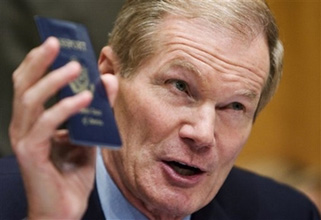 |
 |
 |
 News from Around the Americas | June 2007 News from Around the Americas | June 2007  
US Senate Launches Hearing Into Passport Backlog
 Bryan Corbin - Courier Press Bryan Corbin - Courier Press
go to original


| | Senate Foreign Relations Committee member Sen. Bill Nelson, D-Fla., flashes his passport as he questions Assistant Secretary of State Maura Harty, not in picture, on Capitol Hill in Washington, Tuesday, June 19, 2007, during the committee's hearing to examine the passport backlog, and the State Department's response to the Western Hemisphere Travel Initiative. (AP/Manuel Balce Ceneta) |
Indianapolis — Inundated with complaints from constituents about ruined vacations, spoiled honeymoons and canceled business trips abroad, a U.S. Senate committee launched a hearing Tuesday into a massive backlog in processing passport applications.

The action by senators comes on the heels of the U.S. State Department’s relaxing slightly new rules forcing U.S. citizens to obtain passports for air travel to and from Mexico, the Caribbean, Canada and Bermuda — destinations for which they previously weren’t required.

A huge spike in applications for passports in light of the new air-travel rules that took effect in January has overwhelmed the State Department’s passport agency, officials say. Members of Congress have said they are besieged with complaints from constituents who applied for passports months ago in anticipation of summer trips, and still have not received them.

During an oversight hearing Tuesday by a U.S. Senate Foreign Relations subcommittee into the backlog, Sen. Richard Lugar described how he had to redeploy his staff to field all the passport complaints his office receives from constituents. Previously, one employee handled that task; now seven do, he said.

He said when his staff made inquiries on behalf of constituents, passport agency employees were courteous and pleasant, but the information they provided “was often erroneous or unhelpful,” he said. “Constituents have been told that their passports were on the way, only to find out days later that no meaningful progress had been made toward processing them.”

Lugar added that as a last-ditch measure, his staff tells constituents facing immediate departures to visit the U.S. State Department regional office in Chicago, in hopes of getting their applications processed the same day. “There, after a long drive, they could undertake the burdensome task of waiting in a line that stretched around the building, working their way through security, and then reapplying for their passport.” For constituents not born in Indiana, or even the United States, and who had already sent in their only birth certificate with their original application, this option proved especially difficult, Lugar said in his statement to the committee.

Such bureaucratic horror stories have prompted Senate and House members of both parties to demand answers from the State Department, which issues passports. The agency has repeatedly said it has hired more staff and redeployed resources to work through this year’s unprecedented demand for passports — culminating in the announcement last week that the rule will be relaxed temporarily.

Until Sept. 30, the State Department said, travelers who applied for U.S. passports but haven’t received them can use a printout of their online passport application. That document, along with a photographic identification, will temporarily admit the traveler back into the U.S., in lieu of a passport. (Some airlines are also requiring government-issued birth certificates.)

Andy Fisher, Lugar’s press secretary, said that in a normal year, the senator’s office received 150 passport complaints a year. But now, “we’re getting about 20 new cases a day,” he said.

The new air-travel rules that took effect in January were prompted by the Western Hemisphere Travel Initiative. And the rules are supposed to tighten further in 2008, when land and sea crossings into Canada and Mexico also will require passports. Congress is concerned that will fuel even bigger demand.

“It does require some review of how much, how many more people and resources will need to be put in place for this passport process, because there will only be more of this in coming months,” Fisher said. “Congress has made it very clear … they don’t want to go through this again.”

The Department of Homeland Security opposed a delay in triggering the new passport rules for driving across the Canadian and Mexican borders. But on Friday, the U.S. House of Representatives voted 379-45 for a 17-month postponement, to give officials until June 2009 to prepare.

That was in an amendment to an appropriations bill, H.R. 2638, that would provide $8.8 billion for the U.S. Customs and Border Protection agency. The underlying bill also passed Friday, 268-150. Reps. Brad Ellsworth, D-8th District, and Baron Hill, D-9th District, voted for both the amendment and the bill, according to the Congressional Record. Now it goes to the Senate.

The Associated Press contributed to this story. | 
 | |
 |



